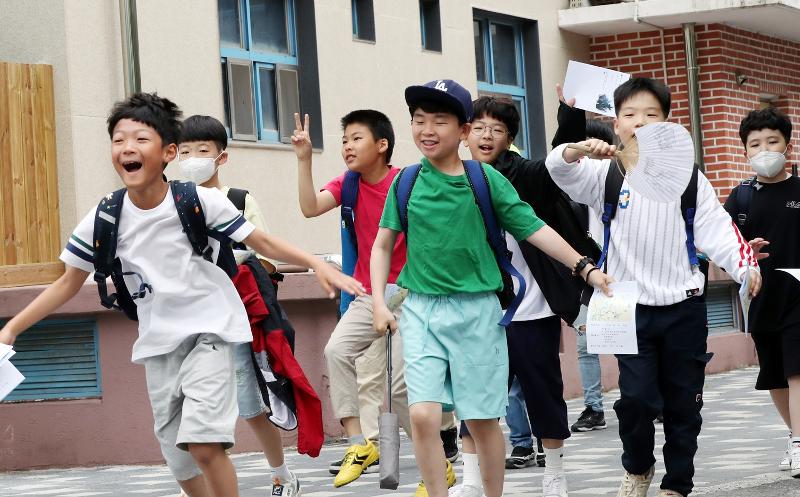
Students on the morning of June 1 at Chipyung Elementary School in Gwangju's Seo-gu District leave for a field trip on the same day that the government lowered the COVID-19 warning level from "critical" to "alert." (Yonhap News)
By Jung Joo-ri
The government on June 1 lifted the mandatory isolation rule for those testing positive for COVID-19.
The Central Disaster and Safety Countermeasures Headquarters (CDSCH) on May 31 said in a meeting at Government Complex-Seoul that its decision came after the warning level for the coronavirus was downgraded from "critical" to "alert." The move came 40 months after the nation's first positive case of COVID-19 was reported on Jan. 20, 2020.
The mandatory isolation period of seven days was cut to five and the mask-wearing rule for indoor areas was lifted everywhere except for hospitals with inpatient facilities and infection-prone residential venues. The CDSCH said masks are still highly recommended for people who test positive for COVID-19, show related symptoms or are at high risk of infection or those in confined, congested or closed indoor areas.
The government also did away with the recommended PCR test for those entering the country on the third day after arrival. The centers for this test will continue running but temporary testing facilities will be closed.
Despite the lowered alert level, the medical response system for COVID-19 and treatment support will remain. Anyone can get a vaccine and related medication free and subsidies will continue for treatment of all inpatients.
Support for living expenses and paid leave for those going into isolation will continue temporarily. Elementary, middle and high school students who test positive are recommended not to attend school for five days and their absence will count as attendance.
Second Vice Minister of Health and Welfare Park Min-soo, who is concurrently first general coordinator of the headquarters, on May 31 said in the body's final meeting, "Today marks the 691st and final meeting of the CDSCH since its launch on Feb. 23, 2020," adding, "We overcame the COVID-19 pandemic and concluded operation of the headquarters after three years and four months."
"From June 1, the alert level of 'critical' ends but this doesn't mean the coronavirus threat has completely ended; we must live with it over a considerable period," he said. "The government will stay on its toes and run the Central Disaster Management Headquarters mainly with health and quarantine authorities to thoroughly manage the quarantine situation."
etoilejr@korea.kr